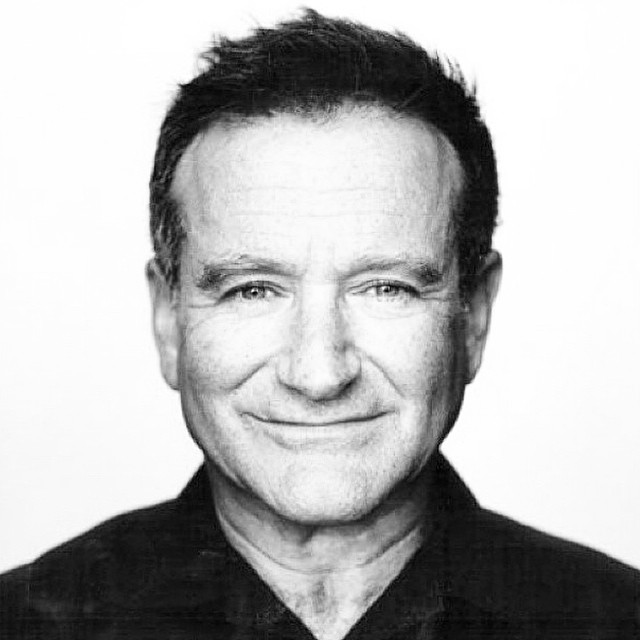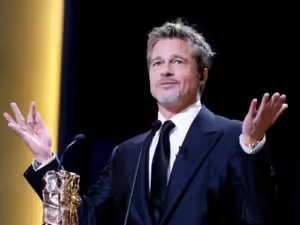
On the 10th anniversary of Robin Williams’s tragic death, his daughter, Zelda Williams, took to social media to clear the air regarding persistent myths surrounding her father.
Notably, she addressed a rumor that has circulated for years: the belief that Robin owned a pet monkey.
This myth stems from a viral photograph featuring Williams with a monkey.
Zelda’s efforts to dispel this misinformation not only honor her father’s memory but also highlight the challenges of navigating public perceptions in the age of social media.
The Myth of the Pet Monkey
Origin of the Rumor
The rumor that Robin Williams had a pet monkey gained traction after a photograph went viral on social media.
This photo, shared by the account Time Capsule Tales, claimed to be taken just days before Williams’s death in 2014, stating that the monkey was his beloved pet.
This misleading narrative fed into the mythos surrounding the actor, adding an eccentric story to his legacy.
Zelda’s Response
Zelda Williams responded with clarity and conviction.
In a recent post, she labeled the claims as “probably AI written BS” and emphatically stated, “Dad didn’t own a pet monkey. NO ONE should.”
This firm rebuttal is significant not only in correcting public misconceptions but also in protecting her father’s legacy from distortion.
By directly addressing the misinformation, Zelda emphasizes the importance of factual representation, especially concerning the lives of those we admire.
The True Story Behind the Monkey
In reality, the monkey featured in the viral image was not a pet owned by Robin Williams.
Instead, it was an animal that appeared in the “Night at the Museum” film franchise.
Williams was actively involved in the creation of “Night at the Museum: Secret of the Tomb,” a movie he filmed shortly before his death.
The monkey now resides at an animal rescue center, and this fact adds another layer of misunderstanding to the original claim.
Remembering Robin Williams
The Last Years of His Life
Robin Williams’s later years were marked by significant health struggles that many of his fans were unaware of.
Although he continued to work and perform, he faced intense personal challenges caused by a misdiagnosis.
Initially believed to be suffering from Parkinson’s disease, Williams was later found to have “Lewy body dementia”, a progressive neurological disorder that can cause severe cognitive decline, memory loss, and even hallucinations.
The Film “Robin’s Wish”
The documentary “Robin’s Wish” released in 2020, sheds light on the actor’s health issues.
It explores his final days, providing insight into his struggles as he sought answers to his deteriorating condition.
The documentary reveals a man who was not only a beloved entertainer but also someone wrestling with immense personal pain.
Zelda and Robin’s widow, Susan Schneider Williams, have described the actor’s journey through this illness as fraught with uncertainty and fear, something that adds a tragic dimension to his legacy.
The Legacy of Love
Zelda’s public statements reflect a desire to preserve her father’s legacy accurately.
In another heartfelt post, she advised followers to approach viral posts about her father’s life with skepticism, asserting that many such claims are often unfounded.
“Maybe just assume they’re all BS (they usually are),” she wrote, underscoring her commitment to ensuring the truth prevails over rumor.
Impact on the Entertainment Industry
Robin Williams’s Contributions
Robin Williams was a transformative figure in the entertainment industry.
His remarkable ability to blend humor with heartfelt performances set him apart.
He became famous not only for his impressive range as an actor but also for his improvisational skills and profound empathy towards others.
Films like “Good Will Hunting”, “Mrs. Doubtfire”, and “Jumanji” showcased the depth of his talent, allowing audiences to connect deeply with his characters.
Advocacy and Awareness
Williams’s candidness about his mental health struggles has sparked important conversations about mental health and well-being in the entertainment industry and beyond.
His life and career have underscored the reality that even the brightest stars face profound challenges.
This openness encourages a culture of understanding and acceptance regarding mental health issues, reminding us that laughter can often mask deeper pain.
Family Tributes and Remembrances
Zelda and Zak Williams Reflect
In the wake of Robin Williams’s death, both Zelda and her brother Zak have shared touching tributes that encapsulate their love for their father.
Zak recently expressed, “Dad, it’s hard to believe it’s been 10 years.
Today, I’m reflecting on the immense love you shared with all of us – your family, your friends, and everyone you met.”
His words reveal an enduring bond that transcends the actor’s celebrity status.
The Importance of Family Connections
The tributes from Robin’s children highlight the qualities that made him such an influential figure in their lives.
They emphasize the values he instilled in them, such as kindness, empathy, and a commitment to fostering connection with others.
Their messages resonate with fans, as they are not just reflections on his career, but a celebration of the personal relationships that defined him as a father.
Robin Williams: The Health Struggles and Misinformation Addressed by Zelda Williams
Robin Williams was a beloved actor and comedian whose impact on film and television continues to be felt.
However, the legacy he left behind is complicated by the health challenges he faced in his final years, as well as the myths and misinformation that have emerged since his passing in 2014.
His daughter, Zelda Williams, has made significant efforts to set the record straight regarding her father’s life and struggles.
This article aims to explore Robin Williams’s health challenges and how Zelda works to combat the misinformation regarding his legacy.
The Health Challenges Faced by Robin Williams
Initial Misdiagnosis
In the years leading up to his death, Robin Williams experienced a series of health challenges that were initially misdiagnosed.
After noticing certain changes in his behavior and physical health, he sought medical advice.
The initial diagnosis was Parkinson’s disease, a neurodegenerative disorder that affects movement and can cause tremors, stiffness, and difficulty with balance.
This diagnosis led him to seek various treatments, but as time went on, Williams continued to experience issues that didn’t align with Parkinson’s symptoms.
The Reality of Lewy Body Dementia
After his passing, it was revealed through an autopsy that Williams was actually suffering from Lewy body dementia (LBD), a form of progressive brain disease that affects cognitive abilities, movement, and mood.
LBD can cause a range of symptoms, such as memory loss, extreme fluctuations in alertness, visual hallucinations, and significant changes in mood and behavior.
This condition is complex and often goes undiagnosed or misdiagnosed, as was the case with Williams.
The Emotional Toll
Williams’s battle with LBD took a significant emotional toll on him and his family.
He faced intense anxiety and confusion, which were exacerbated by the nature of the illness.
The struggle for a correct diagnosis contributed to feelings of frustration and helplessness, both for him and those around him.
Despite these challenges, Williams maintained his commitment to his work and continued to film projects, demonstrating his dedication and passion for his craft even in the face of adversity.
The Impact on His Career
Williams’s deteriorating health had a profound impact on his career.
He was known for his high-energy performances and comedic genius, but the effects of Lewy body dementia began to affect his ability to perform.
He continued to work on films, including the third installment of “Night at the Museum,” but the struggles he faced often went unseen by the public.
Zelda and other family members expressed that he was a beloved figure who struggled in silence.
This underserved narrative highlights the importance of awareness regarding mental and neurological health issues.
Zelda Williams’s Fight Against Misinformation
Addressing the Myths
In the wake of her father’s death, Zelda Williams has actively worked to combat various myths and rumors that have circulated about him.
One prominent myth is the belief that he owned a pet monkey.
This rumor was spread through a viral photo showing Williams with a monkey, which was misleadingly presented as proof of ownership.
The post claimed the image was taken shortly before his death, further feeding into the sensational narrative.
Clarity Through Social Media
Zelda responded to these false claims directly on her social media platforms.
She described the misinformation as “probably AI written BS” and firmly stated, “Dad didn’t own a pet monkey. NO ONE should.”
By addressing the rumors openly, she sought to provide clarity and honor her father’s truth.
This also serves as a powerful reminder of the role social media plays in the dissemination of information, both true and false.
Advocacy for Accurate Representation
Zelda Williams has taken it upon herself to educate the public about her father’s life and struggles.
In various posts, she has urged her followers and the media to approach sensational claims with skepticism.
She stated, “Since more completely false or badly researched posts are likely to go viral on Dad’s death anniversary, maybe just assume they’re all BS (they usually are).”
This statement highlights the difficulty families face in an era where misinformation can spread rapidly, often overshadowing the truth.
Importance of Mental Health Awareness
By revealing the truth about her father’s health condition, Zelda has become an advocate for mental health awareness.
She emphasizes the importance of understanding neurological disorders like Lewy body dementia and the impact they can have on individuals and their families.
Her advocacy not only sheds light on her father’s battles but also aims to promote a better understanding of the complexities of mental and neurological health.
Preserving His Legacy
Zelda’s determination to combat misinformation also stems from her desire to preserve her father’s legacy accurately.
Robin Williams was known not just for his comedic talent but also for his compassion and generosity.
By addressing false narratives, she aims to ensure that his true story, including his struggles and triumphs, is recognized and respected.
Understanding Lewy Body Dementia and Mental Health Awareness in the Entertainment Industry
Lewy body dementia (LBD) is a complex and often misdiagnosed condition that affects millions of people worldwide.
It is crucial to raise awareness about this disorder and its impact on individuals and families.
In addition, the entertainment industry plays a unique role in mental health awareness, as it is a powerful platform for influencing public perceptions and conversations about health challenges.
This article discusses Lewy body dementia, its effects on individuals, and how mental health awareness can be improved within the entertainment industry.
What is Lewy Body Dementia?
Definition and Causes
Lewy body dementia is a progressive neurological disorder characterized by the accumulation of abnormal protein structures called Lewy bodies in the brain.
These structures affect neurotransmitters, particularly dopamine and acetylcholine, which are essential for regulating mood, memory, and motor skills.
LBD is distinct from other types of dementia, such as Alzheimer’s disease and Parkinson’s disease, yet it shares symptoms with both.
Symptoms
The symptoms of Lewy body dementia can vary widely among individuals, but some common signs include:
- Cognitive Decline: Individuals may experience significant memory loss, confusion, and difficulty with problem-solving or reasoning. Their ability to think clearly can fluctuate, leading to periods of clear thinking alongside periods of confusion.
- Motor Symptoms: Many people with LBD exhibit symptoms similar to those of Parkinson’s disease, such as tremors, stiffness, and difficulty with balance and movement.
- Visual Hallucinations: A defining characteristic of LBD is the presence of visual hallucinations, where individuals may see things that are not there. These hallucinations can be distressing and may lead to increased confusion.
- Sleep Disorders: Individuals with LBD often struggle with sleep disturbances, including REM sleep behavior disorder, where they act out their dreams, leading to potential injury.
- Mood and Behavioral Changes: LBD can lead to fluctuations in mood, increased anxiety, depression, and changes in behavior. Individuals may become more withdrawn or exhibit changes in personality.
Impact on Individuals and Families
The impact of Lewy body dementia is profound, not only on the individuals diagnosed but also on their families and caregivers.
The fluctuating nature of the illness can create immense emotional and psychological strain.
Families often find themselves navigating a complex maze of symptoms, which can be difficult to manage and understand.
Caregivers frequently experience feelings of frustration, helplessness, and sadness as they watch their loved ones struggle with their cognitive and physical health.
Improving Mental Health Awareness in the Entertainment Industry
The Unique Role of the Entertainment Industry
The entertainment industry wields significant influence over public perceptions and attitudes toward mental health issues.
Stars and films often shape societal narratives, making it essential to promote accurate and compassionate representations of mental health struggles.
Increased Representation in Media
- Authentic Storytelling: Filmmakers and writers should strive to create authentic stories that reflect the realities of mental health challenges, such as Lewy body dementia and other neurological disorders. By depicting these issues with honesty and sensitivity, filmmakers can help to educate audiences and foster empathy.
- Diverse Character Portrayals: Including a wider range of characters with mental health conditions can help normalize these experiences in popular culture. When viewers see mental health issues represented in a nuanced way, it can lead to a better understanding and acceptance of individuals living with these challenges.
Collaborations with Mental Health Organizations
The entertainment industry can benefit from partnerships with mental health organizations that specialize in education and advocacy.
Collaborating on campaigns, films, or charity events can help raise awareness about mental health issues and provide resources for those affected by them.
Promoting Open Conversations
- Sharing Personal Stories: Celebrities speaking openly about their own mental health challenges can have a powerful impact. When public figures share their experiences, it can inspire others to seek help, reduce stigma, and encourage open dialogue about mental health.
- Panel Discussions and Interviews: Organizing events, panel discussions, and interviews focused on mental health in the entertainment industry can further promote understanding. These initiatives can highlight the importance of mental health support and resources available to individuals in the industry and beyond.
Training and Support for Talent
To foster a healthier environment, the entertainment industry should prioritize mental health training and support for its members.
This includes learning how to recognize signs of mental health struggles, providing access to resources, and ensuring that individuals in the industry have the support they need during difficult times.y have the support they need during difficult times.



















